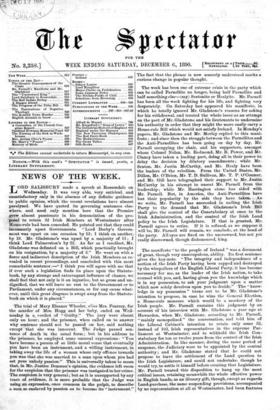The week has been one of extreme crisis in the
party which can be called Parnellite no longer, being half Parnellite and half something else—Ksay) Sextonite or Healyite. Mr. Parnell has been all the week fighting for his life, and fighting very desperately. On Saturday last appeared his manifesto, in which he totally ignored Mr. Gladstone's reasons for asking for his withdrawal, and treated the whole issue as an attempt on the part of Mr. Gladstone and his lieutenants to undermine his authority in order that they might the more easily carry a Home-rule Bill which would not satisfy Ireland. In Monday's papers, Mr. Gladstone and Mr. Morley replied to this mani- festo ; and since then the struggle between the Parnellites and the Anti-Parnellites has been going on day by day, Mr. Parnell occupying the chair, and his supporters, amongst whom Colonel Nolan, Mr. Redmond, Mr. R. Power, and Mr. Clancy have taken a leading part, doing all in their power to delay the decision by dilatory amendments ; while Mr. Sexton, Mr. Justin McCarthy, and Mr. Healy have been the leaders of the rebellion. From the United States, Mr. Dillon, Mr. O'Brien, Mr. T. D. Sullivan, Mr. T. P. O'Connor, and Mr. Gill have telegraphed their support to Mr. Justin McCarthy in his attempt to unseat Mr. Parnell from the leadership ; while Mr. Harrington alone has sided with Mr. Parnell. But, in America, the Anti-Parnellites have lost their popularity by the side they have taken. As we write, Mr. Parnell has succeeded in nailing the Irish Party to the demand that Mr. Gladstone's Irish Bill shall give the control of the Constabulary at once to the Irish Administration, and the control of the Irish Land policy to the Irish Legislature. If that is granted, Mr. Parnell agrees to retire. If it is refused, as we suppose it will be, Mr. Parnell will remain, we conclude,, at the head of the party. All eyes are fixed on the uncrowned, but not yet really discrowned, though dishonoured, king.






















































 Previous page
Previous page